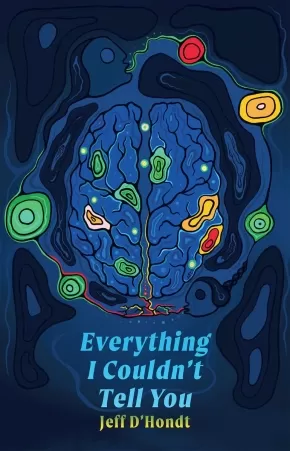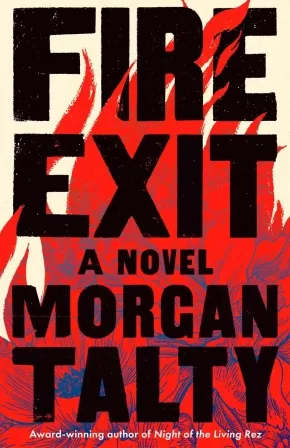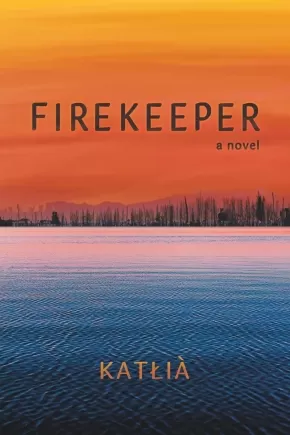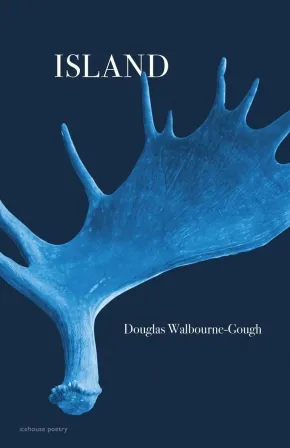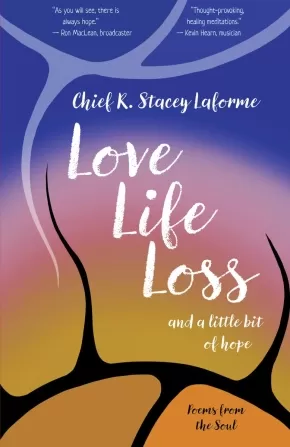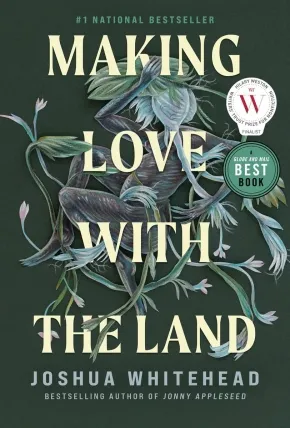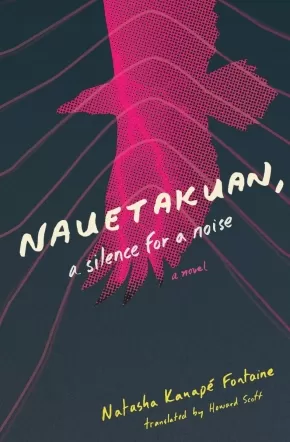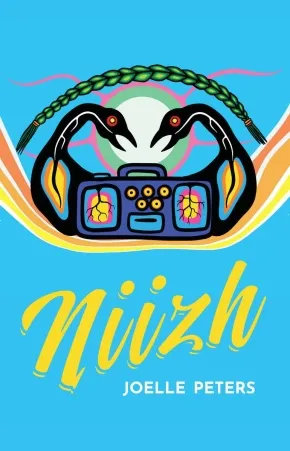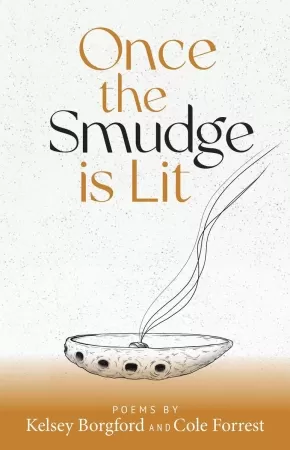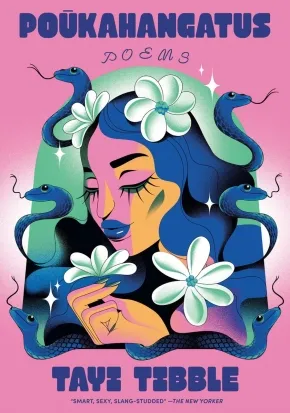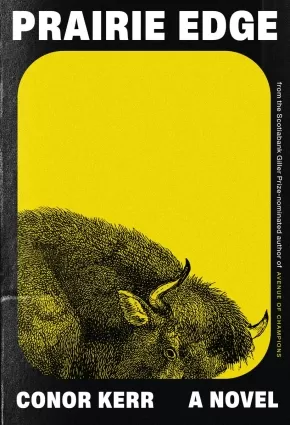
Literary Studies
46
-
60
of
330 Results;
Sort By
Go To
of 22
Cold: A Novel
$24.95
Format:
Paperback
Text Content Territories:
Indigenous Canadian; First Nations; Anishinaabeg; Cree (Nehiyawak);
Reading Level: N/A
ISBN / Barcode: 9780771002892
Synopsis:
Synopsis:
A tragic plane crash that leaves two women stranded and fighting for their lives kicks off this sweeping and hilarious novel from award-winning writer Drew Hayden Taylor that blends thriller, murder mystery, and horror with humour and spectacle.
Elmore Trent is a professor of Indigenous studies who finds himself entangled in an affair that's ruining his marriage; Paul North plays in the IHL (Indigenous Hockey League), struggling to keep up with the game that's passing him by; Detective Ruby Birch is chasing a string of gruesome murders, with clues that conspicuously lead her to both Elmore and Paul. And then there's Fabiola Halan, former journalist-turned-author and famed survivor of a plane crash that sparked a nationwide tour promoting her book.
What starts off as a series of subtle connections between isolated characters quickly takes a menacing turn, as it becomes increasingly clear that someone—or something—is hunting them all.
Taking tropes from the murder mystery, police procedural, thriller, and horror genres, Drew Hayden Taylor weaves a pulse-pounding and propulsive narrative with an intricate cast of characters, while never losing the ability to make you laugh.
Reviews
"Cold is an absolutely enthralling novel from a legendary writer and storyteller. Drew Hayden Taylor is a master of genuinely capturing contemporary Indigenous realities in fiction, making the vibrant characters in this exceptional story relatable and real. Cold is creepy and funny, smart and lively, and overall a strikingly dynamic book that will keep readers on edge from start to finish."—Waubgeshig Rice, author of Moon of the Crusted Snow and Moon of the Turning Leaves
"The myth of the Wendigo has shaped narratives from Pet Semetary to Shadow Country to The Hunger—but never in my reading has it been so cleverly and relevantly employed as it is in Drew Hayden Taylor's serpentine and haunting new novel, Cold." —Nick Cutter, author of The Troop and Little Heaven
Additional Information
368 pages | 5.50" x 8.25" | Paperback
Everything I Couldn't Tell You
$18.95
Format:
Paperback
Text Content Territories:
Indigenous Canadian; First Nations; Lenape (Delaware);
Reading Level: N/A
ISBN / Barcode: 9780369104830
Synopsis:
Synopsis:
Revived from a coma after a traumatic event, Megan’s injuries leave her capable of great violence, forcing her desperate physician Cassandra to recruit Alison, an Indigenous clinician, as her consultant. Alison uses an innovative form of technologically enhanced expressive arts therapy to augment the rehabilitative effects of speaking Lenape, their shared (and almost extinct) language. However, this reminder of cultural expression and identity triggers Megan, putting herself into a life-threatening situation. With Megan’s safety in jeopardy, Alison must internalize a life-changing lesson to be able to save her: pain is often unjust, but it also reminds us that we’re alive.
Everything I Couldn’t Tell You is a potent reminder of the healing and rehabilitative power within Indigenous languages.
Reviews
“Science, music, art and language combine in the search of a healing prayer in [the] . . . mind-blowing, heart-wrenching Everything I Couldn’t Tell You.” — Life With More Cowbell
Additional Information
112 pages | 5.37" x 8.38"
Fire Exit: A Novel
$34.00
Format:
Hardcover
Text Content Territories:
Indigenous American; Native American; Penobscot;
Reading Level: N/A
ISBN / Barcode: 9781039056428
Synopsis:
Synopsis:
Does she remember this day? Does she remember it at all? Does she know this history—this story—her body holds secret from her?
From the porch of his home, Charles Lamosway has watched the life he might have had unfold across the river on Maine’s Penobscot Reservation. On the far bank, he caught brief moments of Roger and Mary raising their only child, Elizabeth—from the day she came home from the hospital to her early twenties. But there’s always been something deeper and more dangerous than the river that divides him from this family and the rest of the tribal community. It’s the secret that Elizabeth is his daughter, a secret Charles is no longer willing to keep.
Now it’s been weeks since he’s seen Elizabeth and Charles is worried. As he attempts to hold on and care for what he can: his home and property, his alcoholic, quick-tempered and big-hearted friend Bobby, and his mother, Louise, who is slipping ever-deeper into dementia—he becomes increasingly haunted by his past. Forced to confront a lost childhood on the reservation, a love affair cut short, and the death of his beloved stepfather, Fredrick, in a hunting accident—a death that he and Louise cannot agree where to lay the blame—Charles contends with questions he’s long been afraid to ask. Is it his secret to share? And would his daughter want to know the truth?
From award-winning author of Night of the Living Rez, Morgan Talty’s debut novel, Fire Exit, is a masterful and unforgettable story of family, legacy, bloodlines, culture and inheritance, and what, if anything, we owe one another.
Reviews
“Fire Exit, Morgan Talty’s debut novel, is utterly consuming. With this book, Talty more than fulfills the promise of his glorious short story collection, Night of the Living Rez. The storytelling is both spellbinding and quietly devastating. The novel is ultimately about family and belonging, about the stories we need to know even when they threaten to burn our lives down. A father desperately wants to let his daughter know about her body’s secret history, even while his mother forgets her son altogether. This book is filled with humor, and humanity’s strange wonder at its own desperation and depravity, as only Talty can do, with his subtle charm and crystalline prose, his sober reckoning with what love can and cannot do, what healing is and is not possible in our families. The novel absolutely smolders.” —Tommy Orange
“Fire Exit is gorgeous. A genuinely original examination of the costs we pay to tell ourselves certain stories about who we are and where we come from. Talty is a revelation on matters of the heart, particularly the tenderness and warfare of contemporary manhood. This is that rare thing: a frankly honest novel about hard things written without a trace of bitterness. I loved it.” —Brandon Taylor
“Talty’s writings feels to me like a gift of many lifetimes. Forgiveness, Morgan shows us, is also the work of a lifetime. The people to whom we feel closest can somehow be right beside us in the kitchen and simultaneously on some unreachably distant planet. People rotate away from each other for days or seasons at a time, and it’s miraculous when they return to find each other again, turning towards each other instead of away. It’s a treacherous thing, to love another person in this world that mixes so much beauty with so much sorrow. Thank you for reminding us, Morgan, that it is the necessary thing.” —Karen Russell
Additional Information
256 pages | 5.50" x 8.25" | Hardcover
Firekeeper: A Novel
$24.00
Format:
Paperback
Text Content Territories:
Indigenous Canadian;
Reading Level: N/A
ISBN / Barcode: 9781773636573
Synopsis:
Synopsis:
Nyla has an affinity to fire. A neglected teen in a small northern town—trying to escape a mother battling her own terrors—she is kicked out and struggles through life on the streets. Desperate for love, Nyla accidentally sets fire to her ex’s building and is then incarcerated for arson. Through community-led diversion, Nyla finds herself on a reserve as their firekeeper. But when climate change–induced wildfires threaten her new home, she knows intimately how to fight back.
The fourth book from acclaimed writer Katłıà brings a Northern Indigenous perspective to the destructive effects of ongoing colonialism. Displaying Katłıà’s enthralling storytelling style, Firekeeper is a coming-of-age tale that addresses intergenerational trauma by reclaiming culture, belonging and identity.
Join Nyla on her healing journey through the fire to sacred waters.
Reviews
“Katłıà’s Firekeeper is an enchanting page-turner of a novel that captured my heart from start to finish. It’s an essential story about finding spirit, family, and home, told through one of the strongest and most authentic protagonists I’ve ever read. I felt like I was right there with Nyla through all her tragedies and triumphs, which is testament to Katłıà’s smooth and heartfelt prose. This book is a celebration of the resilient spirit and leadership of Indigenous women.”—Waubgeshig Rice, author of Moon of the Crusted Snow
“Written with searing truth and genuine heart, breathtaking at times in its description of life, living, dying and death - Firekeeper is a loving testament to the power of kindness and of gentleness. Piercing and honest, with an eye for detail in chaos, the writing and voice are humble and humbling. This is Katłı̨̀ą’s best work to date.”— Tracey Lindberg, writer, scholar, Indigenous Rights activist and the author of Birdie
Additional Information
176 pages | 5.50" x 8.50" | Paperback
First Métis Man of Odesa
$18.95
Format:
Paperback
Text Content Territories:
Indigenous Canadian; Métis;
Reading Level: N/A
ISBN / Barcode: 9780369105127
Synopsis:
Synopsis:
Matt and Masha hit it off during a theatre research trip in Ukraine. At first they seem like opposites: Masha loves the sea, Matt loves mountains. Masha is Ukrainian, Matt is Métis. But the passionate spark ignited between them cannot be denied. Despite the improbabilities of a cross-continental relationship, a few fairy-tale visits overseas solidifies their bond. But when it seems distance could be the only obstacle in their path, a series of extreme circumstances put their commitment to the ultimate test.
Based on actual events, First Métis Man of Odesa is the extraordinary true story of a whirlwind romance that withstands a global pandemic, a surprise pregnancy, and the Russian invasion of Ukraine. Transcending the usual tropes of documentary theatre, this heartwarming how-we-got-together tale turns art of the here and now into a catalyst for action and a hopeful ode for a better future.
Awards
- 2024 Dora Mavor Moore Award for Outstanding New Play winner
Reviews
“A star-crossed, windswept, war-torn romcom that waltzes back and forth across the threshold that separates dreams from nightmares.” — Ben Waldman, Winnipeg Free Press
“Many of the best tales in the show are so deeply improbable, or so straightforwardly honest, that the plot lines could never have held up as fiction; but as the true stories they are, they triumph.” — Julia Peterson, Saskatoon StarPhoenix
“For all its full-blown drama, First Métis Man of Odesa retains a dreamy charm without ever letting go of the truth.”— Liane Faulder, Edmonton Journal
Additional Information
80 pages | 5.12" x 7.62" | Paperback
Island
$22.00
Format:
Paperback
Text Content Territories:
Indigenous Canadian; First Nations; Mi'kmaq (Mi'gmaq);
Reading Level: N/A
ISBN / Barcode: 9781773103396
Synopsis:
Synopsis:
“Canada rejected our applications for enrolment in the Qalipu First Nation. Initially, I was relieved by the rejection. I’d watched my hometown divide itself — are you Mi′kmaq or settler? Mi′kmaq or not Mi′kmaq enough?”
Centred around the Newfoundland Mi'kmaq experience in the wake of the controversial Qalipu First Nation enrolment process, Island wades through the fracture and mistrust that continues to linger in many communities. In this new collection, Douglas Walbourne-Gough expands upon issues of identity and history that he introduced in Crow Gulch, offering a deeply personal and equally beautiful exploration of Mi'kmaw and Newfoundland identity.
Walbourne-Gough’s narrative poems trace the formation of identity, not through status documentation, but through its deeper roots in childhood memories, family, spirituality, and dreams. Throughout this collection, he approaches life in fragments — snuggling into his nan’s sealskin snowsuit, learning Mi'kmaq from an app, or the myriad of complex emotions that come with receiving a status card — and watches them transform into pieces of an everlasting puzzle. Island reckons with an often-ignored, yet persistent, effect of colonialism — fractured identities.
Additional Information
80 pages | 5.50" x 8.50" | Paperback
Liturgy of Savage No. 82
$20.00
Format:
Paperback
Text Content Territories:
Indigenous Canadian; First Nations; Innu (Montagnais-Naskapi);
Reading Level: N/A
ISBN / Barcode: 9781773860664
Synopsis:
Synopsis:
Originally from the community of Ekuanitshit (Mingan) in the Lower North Shore region of Quebec, Cousineau-Mollen was adopted at a very young age by an urban family as part of what is now known as the Sixties Scoop. Although Cousineau-Mollen did not grow up in an Indigenous community, her adoptive family maintained contact with her biological family, ensuring she remained connected to her culture and identity. Having faced adversity and rejection during her studies at Laval University due to her Indian Status, she has since worked to build and support community initiatives, through Aboriginal student associations and involvement in the Wolf Pack Street Patrol, for the Indigenous homeless people of Montreal. In The Liturgy of Savage No. 82, Cousineau-Mollen reclaims, honours, and makes space for herself and the rights of Indigenous women. A powerful and emotional poetry collection, The Liturgy of Savage No. 82 explores the realities facing Indigenous women in Canada and the emotional impact of homelessness, intergenerational trauma and systemic racism, all through a feminist lens as she considers the implications of femininity and identity in relation to the unceded land of her people.
Reviews
“Cousineau-Mollen’s poetry embodies resilience, and how the impact of colonization has affected Indigenous peoples, and First Nation women in particular.”—Shannon Webb-Campbell, Muskrat Magazine on Bréviaire du matricule 082 (Éditions Hannenorak, 2019)
Additional Information
72 pages | 5.50" x 8.00" | Paperback
Love Life Loss and a little bit of hope: Poems from the Soul
$24.95
Format:
Paperback
Text Content Territories:
Indigenous Canadian; First Nations; Anishinaabeg; Ojibway; Mississaugas;
Reading Level: N/A
ISBN / Barcode: 9781990735431
Synopsis:
Synopsis:
“We should not have to change to fit into society the world should adapt to embrace our uniqueness.” -- Chief Stacey Laforme
Chief Stacey Laforme breathes life into every poem and story he shares, drawing from his own experiences. Rich with the essence of his soul, the poems in this book capture the moments and emotions that have shaped him. His desire is for readers to not just read, but to truly feel the humour and pain intertwined in these poems. Much like in Living in the Tall Grass, this latest poetry collection invites non-Indigenous people to see through the eyes of Indigenous people with topics of peace and humanity, as well as grief, trauma ... and hope.
Reviews
"Thought provoking, healing meditations. Giima Laforme writes from his perspective as a son, father, husband, community leader, but most of all as a human being. He invites us to walk with him, and to see the world as he sees it. Not only is this an invitation we should accept, but it is also a beautiful and generous gift." — Kevin Hearn, musician
"Chief Stacey Laforme writes with the motive of love, and poetry is his instrument. When considering the unmarked graves at residential schools, Chief Laforme’s poem ‘Debwewin—Truth’ freezes you with the line, “She felt the shovels enter her body.” But as you will see, there is always hope. Chief has both the scalpel and the suture. He cuts, then he cures." —Ron MacLean, broadcaster
Additional Information
160 pages | 8.50" x 5.50" | Paperback | 3 b&w illustrations
Making Love with the Land (PB)
$22.95
Format:
Paperback
Text Content Territories:
Indigenous Canadian; First Nations; Anishinaabeg; Oji-Cree;
Reading Level: N/A
ISBN / Barcode: 9780735278868
Synopsis:
Synopsis:
The boundary- and genre-bending non-fiction collection from the Giller-longlisted, GG-shortlisted and Canada Reads– winning author of Jonny Appleseed.
“The land and its elements are my aunties calling me home, into that centre point which is a nowhere, by which I mean a place that English has no words for, is an everywhere, is a bingo hall, is a fourth plane, is an ocean.”
Making Love with the Land is a startling, challenging, uncompromising look at what it means to live as an Indigenous person “in the rupture” between identities. In these ten unique, heart-piercing non-fiction pieces, award-winning writer Joshua Whitehead illuminates the complex moment we’re living through now, in which Indigenous and non-Indigenous peoples are navigating new and old ideas about “the land.” He asks: What is our relationship and responsibility towards it? And how has the land shaped ideas, histories, words, our very bodies?
Intellectually thrilling and emotionally captivating, this book is a love song for the world—and for the library of stories to be found where body meets land, waiting to be unearthed and summoned into word.
Reviews
"[Making Love With the Land] defies categorization . . . mov[ing] between genres and languages in a series of essays that open up a whole new window on the meaning of Canadian literature.” —Maclean’s
“Joshua Whitehead is one of those rare writers: he can turn his hand to any form and make it his own. . . . Making Love with the Land is a series of essays with a fluidity, as you might expect from Whitehead, between form and subject.” —Toronto Star
“Defiantly artful . . . alert to so much of the beauty and theterror of the world . . . While reading, I was entirely overcomewith gratitude . . . A truly dazzling feat of heart, analysis,and sentence-making.” —Billy-Ray Belcourt, author of A History of My Brief Body
“In this essay collection, Joshua Whitehead pushes at the possibilities of form, and the results are consistently a mix of the revelatory and the sublime. A chiaroscuro of self-questioning directed inward as a way to go outward—affectionate, resolute, playful, and wise. Brilliant lessons learned are on offer here, but more as an invitation to re-experience what you might not know you know.” —Alexander Chee, author of How to Write an Autobiographical Novel: Essays
“In his latest “wonderwork,” Whitehead continues his signature and significant mission to undo colonial notions of genre, pushing the boundaries of memoir and cultural commentary into a wholly new, otherworldly terrain. Here, he makes love with body, kin, queerness, and music, demonstrating how making love isn’t just an act of pleasure, but also one of grief, pain and sometimes even solitude. A voice to listen to, learn from, cherish.” —Vivek Shraya, Author of People Change and I’m Afraid of Men
Additional Information
240 pages | 5.19" x 7.98" | Paperback
Nauetakuan, a silence for a noise
$23.00
Format:
Paperback
Text Content Territories:
Indigenous Canadian; First Nations; Innu (Montagnais-Naskapi);
Reading Level: N/A
ISBN / Barcode: 9781771668941
Synopsis:
Synopsis:
"What's happening to you is just that the visible and the invisible are finding each other through you. You are the passageway for our reconnection. You and your generation are the ones who will give our memory back to us..."
Monica, a young woman studying art history in Montreal, has lost touch with her Innu roots. When an exhibition unexpectedly articulates a deep, intergenerational wound, she begins to search for a stronger connection to her Indigeneity. A quickly found friendship with Katherine, an Indigenous woman whose life is filled with culture and community, underscores for Monica the possibilities of turning from assimilation and toxic masculinity to something much deeper-and more universal than she expects.
Travelling across the continent, from Eastern Canada to Vancouver to Mexico City, Monica connects with other Indigenous artists and thinkers, learning about the power of traditional ways and the struggles of other Nations. Throughout these journeys, physical and creative, she is guided by visions of giant birds and ancestors, who draw her back home to Pessamit. Reckonings with family and floods await, but amidst strange tides, she reconnects to her language, Innu-aimun, and her people.
A timely and riveting story of reclamation, matriarchies, and the healing ability of traditional teachings, Nauetakuan, a silence for a noise underscores how reconnecting to lineage and community can transform Indigenous futures.
Reviews
"A love letter to residential school survivors dedicated to their descendants... To create the universe of Nauetakuan, populated by giant animals and marvelous creatures, including the thunderbird, Natasha Kanapé Fontaine was inspired by her own dreams, various native myths, and ancient legends taught to her by Joséphine Bacon." -Le Devoir
"Poet, singer, actress, and Innu activist, the talented Natasha Kanapé Fontaine has written her first hard-hitting novel this fall, which cuts through us like a lightning bolt." -Le Journal de Montréal
Educator Information
Translated by Howard Scott.
Additional Information
248 pages | 5.25" x 8.00" | Paperback
Niizh
$18.95
Format:
Paperback
Text Content Territories:
Indigenous Canadian; First Nations; Anishinaabeg;
Reading Level: N/A
ISBN / Barcode: 9780369105219
Synopsis:
Synopsis:
It’s summertime on the rez. The frybread is sizzling, and the local radio station plays bluegrass, Anishinaabemowin lessons, and Friday-night bingo numbers. Lenna, the youngest of the Little family, is preparing to leave home for her first year of college, with little enthusiasm or help from her stubborn father and reckless brother. Amidst lingering doubts about departing the family flock, Lenna collides into a meet-cute with the charming and awkward Sam Thomas, who is returning to the reserve after many years away. With the promise of a romance budding between them, Lenna is caught in a whirlwind of uncertainty, wondering if she’s ready to bid farewell just as she's about to take flight.
Filled with Indigenous humour, small-town seasoning, and dream-world interludes, this heartwarming love story captures the bittersweet highs and lows of a rural teenage upbringing. A love letter to community, Niizh is a refreshing coming-of-age romcom about two young lovebirds leaving the nest.
Reviews
“In Niizh, Joelle Peters offers up a profound love and simultaneous longing for family and community. She stages generational strengths—humour, caring, and insightfulness—alongside generational wounds that can keep our dearest at arm’s length. This disarmingly simple story is artfully crafted with dialogue featuring a uniquely Peters-ian dry wit. Niizh is a celebration of the joys, beauties, and challenges of a young and fiercely capable Indigenous woman.” — Tara Beagan
“I was excited about this play the first time I read it. It's smart and funny, and it's exactly what we need right now.” — Keith Barker
“Joelle can write the rez. Conveying the history, the hardship, but, more than anything, the humour and the beauty of our complicated communities. And to see those spaces on stage is a powerful thing.” — Falen Johnson
“What's most satisfying is how many themes Peters layers into the script—including the loss of Indigenous language and culture, the fear of failure of those embarking on something new and, most poignantly, the shame and anger around abandonment.” — Glenn Sumi
Additional Information
112 pages | 5.40" x 8.35" | Paperback
Once the Smudge is Lit
$20.00
Artists:
Format:
Paperback
Text Content Territories:
Indigenous Canadian; First Nations; Anishinaabeg; Ojibway; Nipissing First Nation;
Reading Level: N/A
ISBN / Barcode: 9781928120407
Synopsis:
Synopsis:
Ceremony, community and connection - the poems of Once the Smudge is Lit carry the reader into deeply spiritual elements of Nishnaabe/Ojibwe culture. Co-written by Cole Forrest and Kelsey Borgford, the poetry of Once the Smudge is Lit highlights the Indigenous experience in post-colonial times through explorations of themes ranging from love to community. Bogford's and Forrest's verses seek to open a multidimensional window into the experience of being a contemporary Nishaabe. A profound sense of movement, connection, and continuity is emphasized by Tessa Pizzale's beautifully evocative illustrations, which include a line of smudge smoke that flows from page to page from beginning to end.
Additional Information
50 pages | 5.50" x 8.50" | 50 Illustrations | Paperback
Poukahangatus: Poems
$24.95
Format:
Paperback
Text Content Territories:
Indigenous Polynesian; Indigenous New Zealander; Maori; Ngati Porou; Te Whanau-a-Apanui;
Reading Level: N/A
ISBN / Barcode: 9780593467893
Synopsis:
Synopsis:
An acclaimed young poet explores her identity as a twenty-first-century Indigenous woman. Poem by poem, Tibble carves out a bold new way of engaging history, of straddling modernity and ancestry, desire and exploitation.
Intimate, moving, virtuosic, and hilarious, Tayi Tibble is one of the most exciting new voices in poetry today. In Poūkahangatus (pronounced “Pocahontas”), her debut volume, Tibble challenges a dazzling array of mythologies—Greek, Māori, feminist, kiwi—peeling them apart, respinning them in modern terms. Her poems move from rhythmic discussions of the Kardashians, sugar daddies, and Twilight to exquisite renderings of the natural world and precise emotions (“The lump in her throat swelled like a sea that threatened to take him from her, and she had to swallow hard”). Tibble is also a master narrator of teenage womanhood, its exhilarating highs and devastating lows; her high-camp aesthetics correlate to the overflowing beauty, irony, and ruination of her surroundings.
These are warm, provocative, and profoundly original poems, written by a woman for whom diving into the wreck means taking on new assumptions—namely, that it is not radical to write from a world in which the effects of colonization, land, work, and gender are obviously connected. Along the way, Tibble scrutinizes perception and how she as a Māori woman fits into trends, stereotypes, and popular culture. With language that is at once colorful, passionate, and laugh-out-loud funny, Poūkahangatus is the work of one of our most daring new poets.
Reviews
“This chatty, winsome debut by a young New Zealand poet mines family history, Maori myth and the residue of pop culture to fashion a striking sensibility.”—The New York Times Book Review
“Tibble writes wittily of the hunger games of adolescence. . . . However lost their youthful personas, these wise poems know exactly where they are heading.”—David Wheatley, The Guardian
“Tibble’s smart, sexy, slang-studded verse is fanciful and dramatic, reveling in the pains and the pleasures of contemporary young womanhood yet undergirded by an acute sense of history. Her voice remains sure-footed across many registers, and the book, at its best, functions as an atlas for learning to explore the world on one’s own terms.”—The New Yorker
“In Tibble’s seismic debut, the young poet’s rollicking, indignant, and invigorating narratives contend with history and navigate what it means to be millennial, female, and of Māori descent. Tibble stares unblinkingly at bigotry, her ferocity consuming the male, white, evangelical gaze she encounters. . . . Tibble’s kinetic use of language makes this an exciting and memorable debut.”—Publishers Weekly (starred review)
Additional Information
96 pages | 5.85" x 8.34" | Paperback
Prairie Edge: A Novel
$24.95
Format:
Paperback
Text Content Territories:
Indigenous Canadian; Métis;
Reading Level: N/A
ISBN / Barcode: 9780771003578
Synopsis:
Synopsis:
The Giller Prize-longlisted author of Avenue of Champions returns with a frenetic, propulsive crime thriller that doubles as a sharp critique of modern activism and challenges readers to consider what “Land Back” might really look like.
Meet Isidore “Ezzy” Desjarlais and Grey Ginther: two distant Métis cousins making the most of Grey’s uncle’s old trailer, passing their days playing endless games of cribbage and cracking cans of cheap beer in between. Grey, once a passionate advocate for change, has been hardened and turned cynical by an activist culture she thinks has turned performative and lazy. One night, though, she has a revelation, and enlists Ezzy, who is hopelessly devoted to her but eager to avoid the authorities after a life in and out of the group home system and jail, for a bold yet dangerous political mission: capture a herd of bison from a national park and set them free in downtown Edmonton, disrupting the churn of settler routine. But as Grey becomes increasingly single-minded in her newfound calling, their act of protest puts the pair and those close to them in peril, with devastating and sometimes fatal consequences.
For readers drawn to the electric storytelling of Morgan Talty and the taut register of Stephen Graham Jones, Conor Kerr’s Prairie Edge is at once a gripping, darkly funny caper and a raw reckoning with the wounds that persist across generations.
Additional Information
272 pages | 5.50" x 8.25" | Paperback
Rangikura: Poems
$37.99
Format:
Hardcover
Text Content Territories:
Indigenous Polynesian; Indigenous New Zealander; Maori; Ngati Porou; Te Whanau-a-Apanui;
Reading Level: N/A
ISBN / Barcode: 9780593534625
Synopsis:
Synopsis:
A fiery second collection of poetry from the acclaimed Indigenous New Zealand writer that U.S. Poet Laureate Joy Harjo calls, “One of the most startling and original poets of her generation.”
Tayi Tibble returns on the heels of her incendiary debut with a bold new follow-up. Barbed and erotic, vulnerable and searching, Rangikura asks readers to think about our relationship to desire and exploitation. Moving between hotel lobbies and all-night clubs, these poems chronicle life spent in spaces that are stalked by transaction and reward. “I grew up tacky and hungry and dazzling,” Tibble writes. “Mum you should have tied me/to the ground./Instead I was given/to this city freely.”
Here is a poet staking out a sense of freedom on her own terms in times that very often feel like end times. Tibble’s range of forms and sounds are dazzling. Written with Māori moteatea, purakau, and karakia (chants, legends, and prayers) in mind, Rangikura explores the way the past comes back, even when she tries to turn her back on it. “I was forced to remember that,/wherever I go,/even if I go nowhere at all,/I am still a descendent of mountains.”
At once a coming-of-age and an elegy to the traumas born from colonization, especially the violence enacted against indigenous women, Rangikura interrogates not only the poets’ pain, but also that of her ancestors. The intimacy of these poems will move readers to laughter and tears. Speaking to herself, sometimes to the reader, these poems arc away from and return to their ancestral roots to imagine the end of the world and a new day. They invite us into the swirl of nostalgia and exhaustion produced in the pursuit of an endless summer. (“My heart goes out like an abandoned swan boat/ghosting along a lake”). They are a new highpoint from a writer of endless talent.
Reviews
"When Tayi Tibble was eight, she decided she’d be a writer...Despite a slew of accomplishment at just 28—including, but not limited to, being the first Māori writer published in The New Yorker and an appearance in in Lorde’s Solar Power music video—she remains miraculously humble....Rangikura, her incendiary second collection, hits bookshelves this week in the States...[In it] Tibble nimbly zig zags from comedic lines about the Kardashians to reflections on ancestral trauma, colonization and love affairs." —Eloise King-Clements, Interview Magazine
Additional Information
96 pages | 6.19" x 8.66" | Hardcover
Sort By
Go To
of 22




